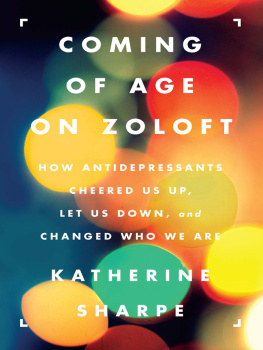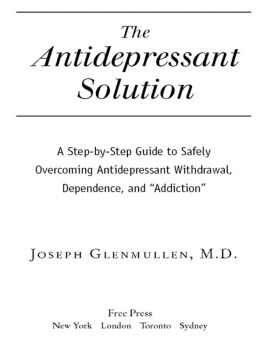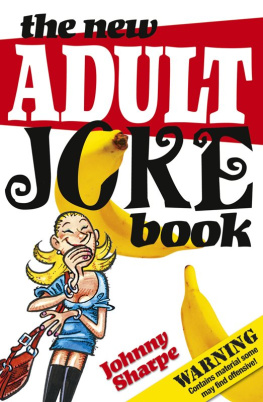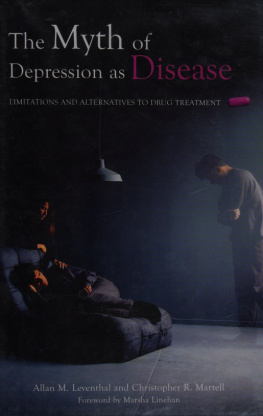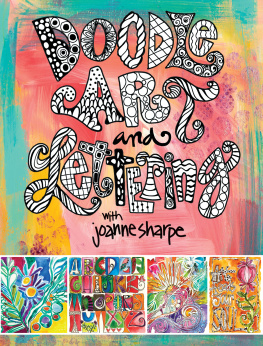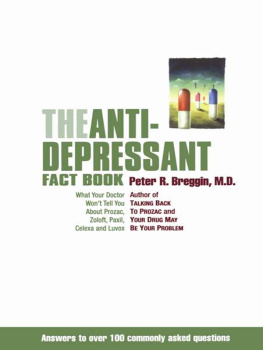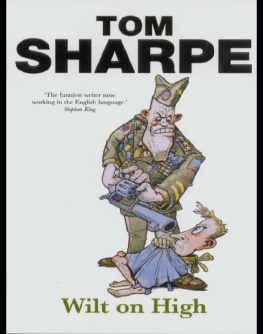
COMING OF AGE ON ZOLOFT
HOW ANTIDEPRESSANTS CHEERED US UP,
LET US DOWN, AND CHANGED WHO WE ARE
KATHERINE
SHARPE

For my parents
Everybodys youth is a dream, a form of chemical madness.
F. SCOTT FITZGERALD
Contents
O ne afternoon late in the summer of 1998, I found myself sitting on the long front porch of a weathered student house in Portland, Oregon. I was nineteen years old and had just returned to town to start my second year of college. The porch I was sitting on belonged to the house that would be home that year to my good friend Kate. I had spent the day helping her move in, relaying loads of clothing, books, and LPs from her car, across the yard, up a staircase scuffed by decades of similar use, and into her new room. At 5:00 P.M. , exhausted, we flopped onto the row of mismatched seating that looked out over the cracked, gray street.
Moving off campus was a sophomore rite of passage at our school, and I considered Kates snagging a room in this particular house to be a promising social development. Her new housemates included some of the students on campus Id looked up to most the year beforesmart, fashionable, confident women who seemed as advanced and distant to me then as I remembered high school seniors seeming when I was in eighth grade. As they filtered in and slowly took their own seats around us, I stretched in my thrift-store lounger and smiled. Simply sharing their porch with them felt glamorous, like a good omen for the year to come.
Late-afternoon sun gilded the floorboards, as our conversation meandered through the familiar topics of professors, classes, boys, and books. Kate headed inside to organize her room, and Lauren mixed a pitcher of Amaretto sours for those who were left. And then the thing happened that has fixed this afternoon in my mind for more than a decade. Casually, and in the abstract, someone mentioned antidepressants.
The comment sent a ripple through me. I had been taking an antidepressant since the year before, when a series of anxiety attacks had led me to the student health center, where Id quickly been diagnosed as depressed and given a prescription for Zoloft. Medication seemed to have helped; the billowing dread that had come upon me during my freshman fall had dissipated, and Id finished out the year with good grades, friends, a boyfriend, new interests. Still, I felt uneasy about my chemically assisted recovery. There was something creepy about taking a mind-altering drug each day, and thinking of myself as a person with a mental disorder was dispiriting in its own right. Aside from a few close friends, I hadnt told anybody I took them; I figured other people would find the fact as off-putting as I did myself.
I still dont know what it was that made me open my mouth that day. Maybe I was lulled by the sunshine, the strange drink, or the urge, in such exalted company, to say something that would call attention to myself.
I take those, I blurted and instantly looked down at my hands, wondering whether Id just effected my own social excommunication. When I managed to raise my eyes again, though, I saw that heads up and down the row were nodding slowly.
I do too, said Helen.
They put me on Prozac last year, Lauren added. And on we went. There were seven girls on that porch. Every single one of us, it turned out, was or had been on antidepressants.
In the moments afterward, we looked out toward the street, where a patch of weeds cast a long shadow across the pavement. This is really weird, somebody said, and the rest of us mumbled assent.
AS I COLLECTED myself in the silence, I felt two things at the same time. The first was a wave of relief so large and pure it almost knocked me over. All year, taking medication had made me feel uneasy. The pills imparted strength and calm, but they also raised tough questions Am I crazy? Will I need these forever? Am I really myself when I take them? that I could neither answer to my satisfaction nor successfully push from my mind. Learning that I wasnt alone in using medication soothed the sense of alienation that had been the pills most notable side effect. If people as poised and admirable as Kates housemates could also take antidepressants, maybe there was still hope for me.
But if learning that I had so much company on the antidepressant bandwagon was comforting in one way, it was disorienting in another. I had been taught to think of antidepressants as a treatment for depression, which I understood as a real illness, something rare and serious. The fact that all seven of us could be taking medication strained the limits of my sense of probability. Were we all, in some meaningful way, mentally ill? Or were antidepressants being given out not for true depression but precisely for the ordinary angst that Id been told was so different from it? If we all had this experience in common, why had we not found out about it until now? I felt a little dizzy, and newly suspicious. What exactly was happening here?
Before that moment, taking antidepressants had felt like the most intimate and personal thing in the world to me. It was still personal, of course, but I began to see then that it was also more than that. Medication was individual, but also social; it was part of our stories, but equally part of the story of a time and place. In a way that I didnt yet fully understand, our lives had intersected with something larger than themselves.
It is strange, as a young person, to realize that you have lived through something that can be considered a real historical change, but thats exactly what we had done. When I was a child, in the early 1980s, taking psychiatric medication was decidedly a fringe phenomenon. Prozac came onto the market in 1987, the year I was eight. The first member of a family of drugs called SSRIs (for selective serotonin reuptake inhibitors), it quickly became the leading edge of a psychopharmaceutical revolution. Throughout the 1990s and 2000s, Americans grew ever more likely to reach for a pill to address a wide variety of mental and emotional problems. We also became more likely to think of those problems as a kind of disease, manifestations of an innate biochemical imbalance. Depression, social anxiety, obsessive-compulsive disorder, and the like went from being strange clinical terms or scrupulously hidden secrets to constituting acceptable topics of cocktail party conversationtalk that was often followed up by chatter about the new miracle drugs for despair.
Statistics bear out the sense of changing habits. Antidepressants began to climb steadily in popularity after Prozacs introduction, eventually becoming a truly mass phenomenon. By 2005, SSRIs had surpassed blood pressure medications to become the most-used class of drugs in America,
Nothing has changed since that moment on the porch, I sometimes think, except that Im not surprised anymore. Antidepressants are part of the story of my generation, an invisible but very real strand woven through our collective experience. Psychiatric medication saturated the country during our childhood and adolescence, and for many of us, the involvement became personal. In our twenties and thirties now, with birthdays that fall from the mid-1970s to the start of the 1990s, we are members of the first generation to have literally grown up on psychiatric medications in significant numbers.
And sometimes those numbers still overwhelm me. Antidepressant use saturates certain populations more than others, which may help explain why antidepressants have often struck me as being even more ubiquitous among my peers than the above figures suggest. Women take them at higher rates than men, a difference that emerges in early adolescence; a recent survey found that 16 percent of women use antidepressants, compared to 6 percent of men. Personally, I cant remember the last time I shared the topic of this book with a group of more than three twenty- or thirtysomethings without eliciting someones own medication story, often from the person I least expected. Not long ago, I was talking to a male friend, age thirty-five, who exclaimed, only half in jest, Ive never known a girl who wasnt on antidepressants! I must have come a long way from Portland, because I knew exactly what he meant.
Next page
